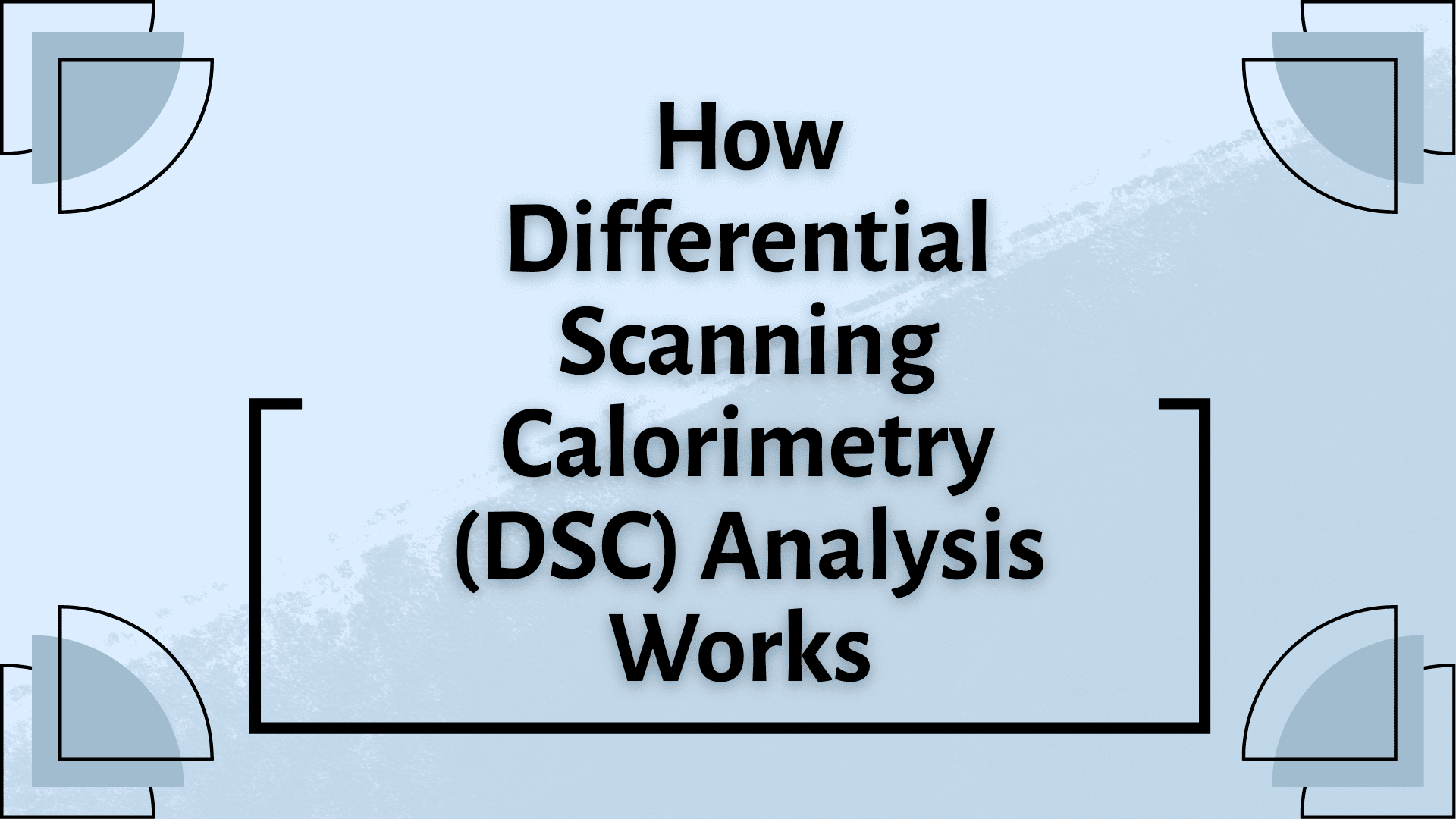Introduction
The Differential Scanning Calorimetry (DSC) Analysis Principle is one of the most important methods used in pharmaceuticals, polymers, food science, and advanced materials research to measure thermal behavior. At ResolveMass Laboratories Inc., our team uses DSC to study phase transitions such as glass transition, melting, crystallization, and heat capacity with high precision. This reliable technique provides detailed thermal data, helping in stable drug formulation, material testing, and process optimization. With its ability to analyze very small samples while delivering accurate results, DSC has become essential for industries that require dependable thermal analysis.
📌 Quick Summary: How Differential Scanning Calorimetry (DSC) Analysis Works
- DSC Principle: Measures heat flow differences between a material sample and a reference during heating.
- Applications: Pharmaceuticals, polymers, food, composites, and advanced materials.
- Benefits: Identifies melting point, crystallization, glass transition, purity, and stability.
- Process: Controlled heating reveals heat flow changes that indicate material properties.
- ResolveMass Expertise: Specialized DSC services across Canada and the United States.
- Why Choose Us: Advanced instruments, experienced scientists, and validated case studies.
🎥 Watch: How Differential Scanning Calorimetry (DSC) Works
What is the Principle of Differential Scanning Calorimetry (DSC) Analysis?
The Differential Scanning Calorimetry (DSC) Analysis Principle is based on comparing the energy required to heat a test sample against an inert reference under the same controlled temperature program. When the sample undergoes a thermal event, such as melting, crystallization, or glass transition, the DSC records a change in heat flow.
This makes DSC a trusted method to study purity, structural stability, and thermal transitions. At ResolveMass Laboratories, our scientists apply this principle to generate precise thermal profiles that support pharmaceutical research, polymer testing, and industrial quality control.
👉 Learn more about our DSC analysis services
How Does Differential Scanning Calorimetry (DSC) Work?
Differential Scanning Calorimetry works by:
- Placing a small sample and an inert reference inside the instrument.
- Applying a programmed heating or cooling cycle.
- Measuring the heat flow differences during thermal transitions.
- Producing a thermogram that shows detailed thermal behavior.
The thermogram provides information about melting, crystallization, glass transition, and other events. This is especially useful for drug stability studies, polymer characterization, food quality control, and advanced material testing. By detecting even small heat changes, DSC helps predict product performance, storage conditions, and long-term reliability in industries where safety and precision are critical.
Key Thermal Events Detected by DSC
| Thermal Event | What it Shows | Industry Use Case |
|---|---|---|
| Glass Transition (Tg) | Softening of amorphous materials | Glass transition analysis |
| Melting Point (Tm) | Solid-to-liquid transition | Pharmaceutical purity tests |
| Crystallization | Molecular ordering | Polymer processing |
| Vitrification | Liquid-to-glass state | Advanced vitrification work |
| Heat Capacity (Cp) | Energy required for heating | Composite testing |
These measurements provide insights into purity, stability, and material performance. For example, Tg analysis ensures correct storage of drugs, while crystallization studies improve polymer durability. Such applications make DSC indispensable across science and engineering fields.
Why is DSC Analysis Important in Research and Industry?
DSC analysis is crucial because it delivers quantitative thermal data needed for innovation and regulatory approval. It allows researchers and manufacturers to:
- Improve drug formulation and stability.
- Monitor quality in polymers and plastics.
- Detect impurities through sharp melting profiles.
- Ensure compliance with strict industrial standards.
Pharmaceutical companies rely on DSC to secure safe and effective products, while manufacturers use it to guarantee consistent material performance. With its proven expertise, ResolveMass supports industries across North America with accurate DSC results and validated case studies.
Types of DSC Techniques
Heat Flux DSC
This technique measures heat differences through thermal resistance. It is widely used in polymer and food industries for general testing.
Power Compensated DSC
This method measures the power needed to keep the sample and reference at the same temperature. It is highly sensitive and preferred for advanced applications.
👉 See our comparison of DSC vs TGA to choose the right thermal technique for your project.
Advantages of DSC Analysis with ResolveMass Laboratories
✔ Precise detection of glass transition (Tg)
✔ Applicable in pharmaceuticals, polymers, and food science
✔ State-of-the-art instrumentation and validated methods
✔ Services available in Canada and the United States
At ResolveMass, each DSC study is carried out under strict quality standards, ensuring regulatory compliance and dependable data. Whether your project is in early R&D, manufacturing, or quality control, our DSC expertise provides insights that accelerate innovation.
👉 Explore our services: DSC Analysis in Montreal and DSC in the United States.
Common Applications of DSC Analysis
- Pharmaceuticals: Drug stability, polymorphism studies, excipient compatibility.
- Polymers: Crystallinity, glass transition, and degradation studies.
- Food Science: Melting behavior, fat content analysis, and product quality control.
- Material Science: Heat capacity, phase transition, and structure analysis.
Because DSC can detect very small heat changes, it has become one of the most trusted techniques for both innovation and quality assurance.
Conclusion
The Differential Scanning Calorimetry (DSC) Analysis Principle is a powerful technique for measuring heat flow during thermal changes in materials. At ResolveMass Laboratories Inc., we combine advanced technology with scientific expertise to deliver reliable DSC results. From pharmaceutical development to polymer and food analysis, our services help companies make informed, data-driven decisions. With accurate thermal insights, industries can improve product safety, stability, and long-term performance.
👉 Contact us today to:
FAQs on Differential Scanning Calorimetry (DSC) Analysis Principle
The Differential Scanning Calorimetry (DSC) Analysis Principle is based on detecting heat flow differences between a sample and a reference. When the material experiences a change such as melting or crystallization, the instrument records the heat absorbed or released. These changes are plotted as a thermogram, helping scientists interpret the thermal behavior of the material with accuracy.
DSC and Thermogravimetric Analysis (TGA) are often used together, but they measure different properties. DSC records heat flow changes during thermal events, while TGA measures weight loss as a sample is heated. For example, DSC identifies melting or crystallization, whereas TGA is ideal for detecting decomposition and moisture loss. Together, they provide a complete view of material behavior.
Yes, DSC is considered one of the most accurate techniques for detecting glass transition temperature (Tg). This transition is critical in polymers and amorphous drugs, as it shows when a material changes from a rigid state to a softer form. By identifying Tg, DSC helps determine suitable storage conditions and ensures product reliability over time.
In the pharmaceutical industry, DSC plays a key role in ensuring drug safety and effectiveness. It helps identify polymorphic transitions, checks ingredient compatibility, and evaluates drug stability under different conditions. By providing thermal profiles, DSC allows scientists to optimize formulations and meet regulatory requirements with confidence.
DSC is usually considered a destructive technique because the sample undergoes heating during analysis. However, the advantage is that it requires only a very small quantity of material—often just a few milligrams. This makes the process efficient while still delivering highly precise data without consuming large amounts of valuable samples.
Heat flux DSC uses a single furnace, where differences in heat flow are measured across a thermal resistance. Power compensated DSC, on the other hand, uses two separate heaters to control the sample and reference individually. While heat flux DSC is widely used for general applications, power compensated DSC offers higher sensitivity for advanced research needs.
DSC is highly reliable for purity analysis because it detects sharp melting points and provides enthalpy measurements. Impurities often shift or broaden the melting profile, making it easy to identify even small variations. This makes DSC a trusted method for checking pharmaceutical purity and ensuring materials meet strict quality standards.
References
- Gill, P., Moghadam, T. T., & Ranjbar, B. (2010). Differential scanning calorimetry techniques: Applications in biology and nanoscience. Journal of Biomolecular Techniques, 21(4), 167–193. https://www.ncbi.nlm.nih.gov/pmc/articles/PMC2977967/
- Durowoju, I. B., Bhandal, K. S., Hu, J., Carpick, B., & Kirkitadze, M. (2017). Differential scanning calorimetry: A method for assessing the thermal stability and conformation of protein antigens. Journal of Visualized Experiments, (121), e55262. https://doi.org/10.3791/55262

